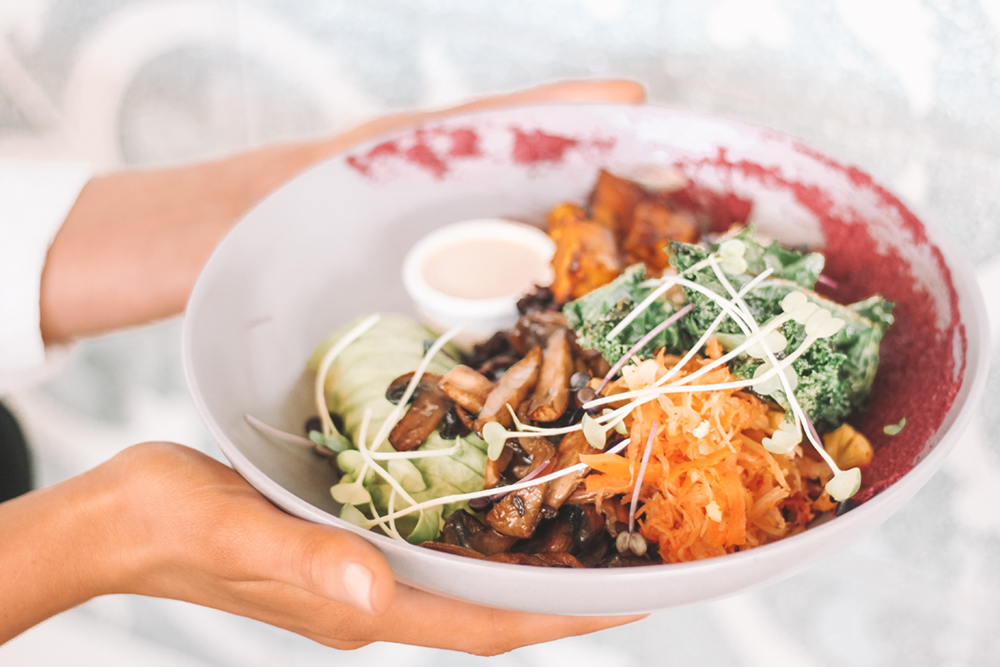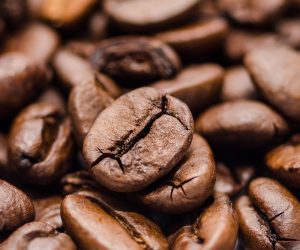
Natural Dietary Treatments for Fibroids
Michael Greger M.D. FACLM via Nutrition Facts – The same diet that helps regulate hormones in women may also reduce exposure to endocrine-disrupting pollutants.
Fibroids are the most common benign tumors in women. They can grow to a foot in diameter and affect the majority of women before they hit menopause. Although fibroids tend to be asymptomatic, when symptoms do occur, they tend to manifest as heavy menstrual bleeding—so much so that women may get anemic and experience a lot of pain. So, what can women do? I discuss this in my video The Best Diet for Fibroids.
Up to half go into surgery and get their entire uterus removed. “Although hysterectomy is generally considered a safe operation, complications occur in a significant proportion of patients” and, obviously, you can’t have kids any more. The alternative is a variety of hormone-modulating drugs, which can shrink the fibroids and provide relief, but many of these drugs have significant side effects, like bone loss, so you really don’t want to be taking them for more than a few months. What’s the bottom line? “There is currently no evidence to support the routine use of medical treatment in women with uterine fibroids.” No wonder many women turn to “complementary and alternative treatments…including exercise, diet, herbs, and acupuncture.”
Women who exercise seven or more hours a week do seem to have lower risk of having fibroids than women who exercise less than around 20 minutes a day, but exercise has never been put to the test for treating fibroids. Likewise, to date, there isn’t a single randomized controlled trial of acupuncture for the treatment of fibroids to help guide us.
In terms of herbs, there are two Asian herbal preparations that show promise—a five-herb combo called Guizhi Fuling and a Malaysian ten-herb formula that contains “secret ingredients” that must not be that secret since they’re just listed in the study, as you can see at 1:50 in my video—and they seemed to work as well as a leading drug. The problem is that traditional Asian herbal remedies may contain a few extra ingredients, like arsenic, mercury, and lead, which have been detected in most of the samples tested from Asian market and health food store shelves, and not just a little. Some, apparently, had really toxic amounts. So, these two Asian herbal preparations “may reduce fibroid size, but there is insufficient evidence to support the efficacy or safety of these treatments.” And, certainly, don’t try to apply caustic herbs internally, as this can lead to scarring, stenosis, and ulceration.
Well, what about diet? In one of the largest studies of diet and fibroids, fibroid tumors were “associated with beef and ham consumption, whereas high intake of green vegetables seems to have a protective effect.” The researchers figured that the “association between levels of estrogen, diet, and breast and endometrial [uterine lining] cancers also may help us understand” why. Indeed, “[f]or breast and endometrial cancers, a direct association with the frequency of consumption of meat and ham was observed…whereas protection was conferred by high intake of vegetables and fruits.” Thus, there may be these shared risk factors between estrogen-responsive malignant tumors, like breast cancer, and estrogen-responsive benign tumors, like fibroids.
We know the presence of fibroids seems to correlate with an increase in the amount of estrogens flowing through your body, for example, and that women eating vegetarian diets have significantly lower levels of excess estrogen. Researchers are using this knowledge to try to explain why there are lower rates of endometrial cancer—that is, lining-of-the-uterus cancer—and possibly breast cancer among vegetarian women, but it could also help explain the fibroid findings. “The incidence of breast cancer among vegetarian American women (Seventh Day Adventists) is 60 to 80 per cent of the incidence among American women in general, and the incidence among women in Africa and Asia is even lower.” Why might vegetarian women have lower estrogen levels? A famous study in the New England Journal of Medicine concluded that it was their “increased fecal output, which leads to increased fecal excretion of estrogen,” resulting in lower blood levels. Double the fecal output, in fact, as you can see at 4:07 in my video.
And, you can put it to the test. Maybe the same reason African-American women have more fibroids is the same reason they have worse breast cancer survival: too much estrogen in their bloodstream due to a less than optimal diet. So, researchers designed a study to see what would happen if they were switched to a more plant-based, higher fiber diet. Compared with the Caucasian women, the African-American women started out with much higher estrogen levels, again helping to explain their increased mortality from breast cancer. But, after they were put on a healthier diet, all of their levels came down, “suggest[ing] that a substantial reduction in breast cancer risk can be achieved” by adopting a diet centered around more whole plant foods. The same also appears to be true for fibroids, especially eating lots of cruciferous vegetables—broccoli, cabbage, and Chinese cabbage—as well as tomatoes and apples.
Women who underwent premature puberty, starting their periods before age 11, may also be at increased risk of fibroids later in life, and we know that higher childhood red meat intake is associated with earlier age of starting one’s period, though total protein and animal protein in general may contribute. For example, girls who eat meat tend to start their periods about six months earlier than vegetarian girls. Those who eat meat analogues like veggie burgers and veggie dogs start their periods nine months later on average, and a similar puberty normalizing influence was found with consumption of whole plants foods, such as beans.
It could also be the endocrine-disrupting pollutants that build up the food chain. Researchers tooksamples of internal abdominal fat from women and found there appeared to be a correlation between the presence of fibroids with the levels of a number of PCBs in their fat. So, does that mean fish-eaters have higher risk of fibroids? Researchers did find a small increase in risk associated with the intake of long-chain omega-3 fats, mostly from “dark-meat fish consumption,” by which they meant fish like sardines and salmon. This could be because of “the endocrine-disrupting chemicals commonly shown in fish,” or it could just be a statistical fluke. It would be consistent with the increased risk seen among “sport-fish consumers.”
Recognizing that diet and endocrine-disrupting persistent organic pollutants have been associated with a variety of gynecologic conditions, including fibroids, researchers looked at consumers of fish fished out of the Great Lakes and found a 20 percent increased risk for every ten years they had been eating the fish. In the most comprehensive study to date, researchers compared pollutant levels in fat samples from women with fibroids to fat liposuctioned out of women without fibroids. They didn’t just find higher levels of PCBs in fibroid sufferers, but also long-banned pesticides, like DDT and hexachlorocyclohexane, PAHs, which are polycyclic aromatic hydrocarbons formed when coal is burned, tobacco is smoked, and meat is grilled, as well as heavy metals, arsenic, cadmium, lead, and mercury. These levels correlated not only to fibroids, but also to seafood consumption or excess body fat. So, the researchers determined that “shedding excess weight and limiting seafood consumption would confer a protective effect” on fibroid tumor development by minimizing exposure to environmental pollutants as much as possible.
Okay, so a plant-based diet may be best, but is there a plant in particular that has been shown to be particularly powerful?
Plant-based compounds with disease-preventive properties, dietary phytochemicals are found in whole grains, fruits, vegetables, beans, split peas, chickpeas, and lentils, herbs, spices, nuts, and certain beverages. As I discuss in my video The Best Food for Fibroids, we know they can help regulate the initiation, promotion, and spread of cancerous tumors, so what about benign tumors like fibroids? Most anti-cancer drugs on the market now were originally derived from plants or plant products, so why not try to use plants to target the inflammation or blood supply of fibroids? Might fibroids be a consequence of chronic inflammation within the body? We know that women with fibroids are more likely to eat more beef and ham, and fewer fruits and green vegetables, but whole plant foods don’t just have anti-inflammatory effects but antioxidant effects as well. “If the generation of free radicals exceeds the protective effects of antioxidants, oxidative damage will occur,” which has been implicated in a variety of disease states, including gynecological conditions such as fibroids.
If you collect fresh fibroids, as well as normal uterine tissue from hysterectomy surgeries, the fibroid cells have significantly fewer antioxidant enzymes, as you can see at 1:20 in my video, so might antioxidant-rich foods help? Well, if you drip some strawberries onto cells in a petri dish, you can apparently kill of some fibroid tumor cells, while leaving normal uterus cells alone. But, what good does that do us? That’s only relevant if we can show those strawberry compounds get absorbed through our gut and achieve high enough concentrations in uterine tissue. The same with curcumin, the component of the spice turmeric. One of its so-called “miraculous” properties is suppressing the growth of uterine fibroid cells, but, again, that was just in vitro. Yes, an inhibitory effect was found and at concentrations that don’t compromise the growth of normal, regular uterine tissue, but my patients are people, not petri dishes.
It’s pretty neat to find out what happens to human fibroid cells as you drip higher and higher concentrations of green tea compounds on them in a test tube, as you can see for yourself at 2:19 in my video, but I care less about what happens in vitro or in mice, whether or not they have any clothes on—one study looked at “a nude mice model”—but there were no randomized, controlled clinical studies until 2013.
Subjects were randomized to green tea extract or placebo for four months. In the placebo group, fibroid volume increased by 24 percent. That’s what fibroids do; they continue to grow. However, those randomized to the green tea group showed a reduction in total fibroid volume—and not just by a little. There was a dramatic decrease, shrinking by almost a third, which is a highly significant difference, as you can see at 3:02 in my video. Okay, but did the women feel any better? Yes, they experienced a dramatic decrease in symptom severity, as well. Month after month, nothing much happened in the placebo group, but those taking the pills that looked the same but happened to contain green tea compounds had consistent improvement and felt lessening symptoms, each month better than the last, as well as an improved health-related quality of life, month after month, that was significantly better than control. What’s more, their blood counts got better too. With all that continued excess blood loss every month, the blood levels kept decreasing in the placebo group, but they reversed in the green tea group. So, anemia also significantly improved, because average blood flow significantly diminished. And, all this—the fibroid shrinkage, less pain, better periods—was achieved with “no adverse effects.”
So, not only were the results comparable to those for the drugs that are commonly used—again, without the side effects—but the results were also comparable to uterine artery embolization, where they try to cut the blood supply to the fibroid, which is great—unless they accidentally cut the blood supply to the rest of the uterus and cause uterine necrosis, one of many reported major complications. Others include death, not only of the fibroid, but also of the patient, along with other potential complications that may arise from accidentally clogging off non-target arteries. In my book, a side-effect-free solution as good as a more invasive procedure is potentially better than. The researchers conclude that green tea compounds show “promise as a safe and effective therapeutic agent for women with symptomatic UFs [uterine fibroids]. Such a simple, inexpensive, and orally administered therapy can improve women’s health globally.”
Relatively safe doesn’t mean risk-free, however. Although there were no liver function abnormalities detected, this was a small study. If you give green tea extract pills to a thousand women for a year, like they did in the Minnesota Green Tea Trial for breast cancer, the livers in about 1 in 17 women started to get inflamed and a few became serious. Now, the dose they used in this study was twice that of the fibroid study and it’s not completely clear if the pills were the only cause, but, in general, we should try to avoid extracts and instead get nutrition from foods as grown—or at least from foods as grown that are then dunked in hot water, like green tea.
The researchers had to use pills in this study, because they wanted it to be a double-blind study and it’s hard to create a placebo tea that looks, smells, and tastes like the real thing. I don’t think we should take green tea extract pills, though. We should drink green tea. The problem is that the dose the researchers used was about 11 cups a day, which would be a lot of caffeine. You could choose decaf, though, and it’s not outside the realm of possibility to drink a couple quarts of tea a day, especially if doing so may shrink your fibroids so much you can keep your uterus. But, for all we know, five cups of tea a day would work or maybe even three cups or one cup. No other dose has been tested, so we just don’t know. But, you can test it in your own life. If you have fibroids, it couldn’t hurt to add a few cups of green tea to your daily diet and see if you start feeling better.
To read the original article click here.
For more articles from Dr. Greger click here.






